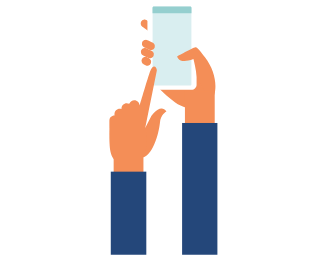Our long-standing befriending service has helped many people over the years, by matching someone who is ready to actively engage in recovery with someone who has walked the same path and has personal experience of recovery. But what’s it like to be a befriender? We asked one of our trained volunteers, Becky, to explain how drawing on her own experience helps her to help others.
- Hi Becky. Let’s start with how would you explain the essence of the befriending service to a friend?
I would describe befriending as a one-to-one support service, whereby the befriendee is closely matched with someone who has experience of their eating disorder. This means they can offer non-judgmental, understanding support as well as highlighting their own pathway out of that eating disorder.
- Could you share some of your own experience with an eating disorder?
I struggled with an eating disorder in my late teens after a build-up of traumatic situations that occurred around that time. Something ‘snapped’ and my eating disorder became the thing I could control and focus on. It was at its worst for a couple of years and recovery was slow because my disordered eating patterns really just shifted around and became obsessive in different ways. It took a lot of growing and security for me to establish healthy eating patterns again.
- Do you feel the befriending service might have helped your own recovery?
Yes! I feel like my recovery would have been so much quicker if I’d had just one person who really understood why I was doing it, and who showed me the happiness that could be on the other side of it.
- Did you feel able to talk to friends and family about your eating disorder?
No… and I have a close relationship with them. However, as I became visibly ill, coping with their stress around it just added to the mounting pressure I felt to just be ok for everyone else. I became very secretive and, have to say, unpleasant to be around.
- So, what did eventually help you to recover, and what was that journey like?
It sounds silly but I think I grew away from it as I realised how unhappy and exhausted I was. I had counselling to address the core issues, but I really feel like the strength to want to recover came from within eventually. My living situation changed and I left home to live with friends and I wanted to be ‘normal’, to fit in and enjoy life like everyone around me. For me, this was the motivation I needed to make some lasting changes.
- Knowing what you do now, how do you think having a befriender might have helped you the most?
I remember feeling extremely lonely, isolated and like a freak who was making everyone around me feel stressed by my actions. It would have been such a comfort to know that what I was doing was a mental health problem and that it wasn’t hopeless. Knowing that they had experience of the same eating disorder would have been so helpful too. It would have meant I could share my deepest concerns but together find ways forward. Most of all I wouldn’t have felt so alone with my recovery; there’d have been someone walking alongside me and willing me on.
- What is the main thing you feel you can offer a befriendee?
Patience, real understanding, and hope! I try to show that we can break harmful patterns and that by addressing the core issues we emerge a stronger person. Most of all, I remind someone that there is always a way out, and sometimes we just need someone to light the way. In a nutshell, that’s what a befriender does. Sometimes, we just need someone to light the way.
